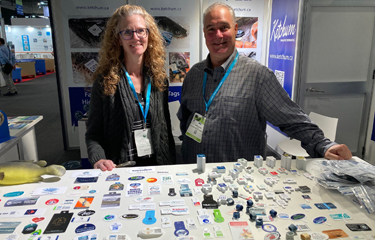Ketchum Manufacturing occupies a singular place in the seafood industry.
The Brockville, Ontario, Canada-based firm is a manufacturer of custom printed labels and tags, and according to owner Jason Baker has worked with the seafood industry for more than 30 years for both foodservice and retail products including salmon, lobster, sea bass, sea bream, and halibut, among others. It now has a client list that includes Cooke, Wester Ross, Creative Salmon, Nordic Blue, Petuna, and Tassal.
“Over the years, we’ve developed a name and reputation for this particular industry,” Baker said. “There’s very few of us doing this – happily, I don’t have that many competitors.”
Primarily, Baker said, tags are used by the seafood industry for two main reasons: branding and traceability. On branding, Ketchum aims to provide a tag that complements the product and enhances its marketing power and appeal, he said.
“In the fresh [fish] case in the supermarket, you literally have two seconds to catch consumers’ attention. And studies have shown if you put branded and unbranded fish side-by-side, sales will be higher for branded pieces,” Baker said. “The seafood section is the least-branded section of the grocery story, and our mission is to change that.”
On traceability, Ketchum is able to provide tag-numbering and sequential QR codes – technology that originated in the agricultural sector, where Ketchum also got its start.
“Over the years, we’ve learned and developed different ways to get traceability into other proteins, including seafood,” Baker said. “People want to know what they’re eating. In some areas of the world, consumers over the years have educated themselves about how their fish how its raised or caught and processed. They know it impacts the quality of what they’re eating. But in areas of the world where that’s less known, we offer that opportunity for our customers.”
A well-done tag can help accomplish both marketing and traceability, Baker said.
“We offer a vehicle that helps educate the consumer as to the attributes of our customers’ products and at the same time helps identify them and, over time, develop a familiarity and relationship with them,” he said.
Currently, Ketchum sells its food-grade plastic tags for USD 0.03 to USD 0.04 (EUR 0.02 to EUR 0.03) each. Asked whether biodegradable tags have seen an increase in popularity as sustainability becomes a bigger decision-making factor for seafood companies, Baker said more customers have inquired, but few are placing orders.
“The price of the material is still prohibitive for customers. In many cases, they have a price range they have to stay in so it’s proportionate to what they’re selling the fish for,” he said. “Until demand goes up, the price will remain high. We will continue to offer them but the prices will always be dependent on volume.”
Baker spoke with SeafoodSource from the floor of Seafood Expo Global in Barcelona, Spain, where he was exhibiting the full range of his company’s tag-making capabilities. He said he attends SEG and Seafood Expo North America every year.
“My customer base is here exhibiting, so it’s a great opportunity for me to have face-to-face contact with them,” he said. “If I was to take trips to meet with them all individually, I would constantly be on the road and never in the office. So it’s a benefit to me that most of our clients are already here at the show as exhibitors.”
Photo courtesy of Cliff White/SeafoodSource







